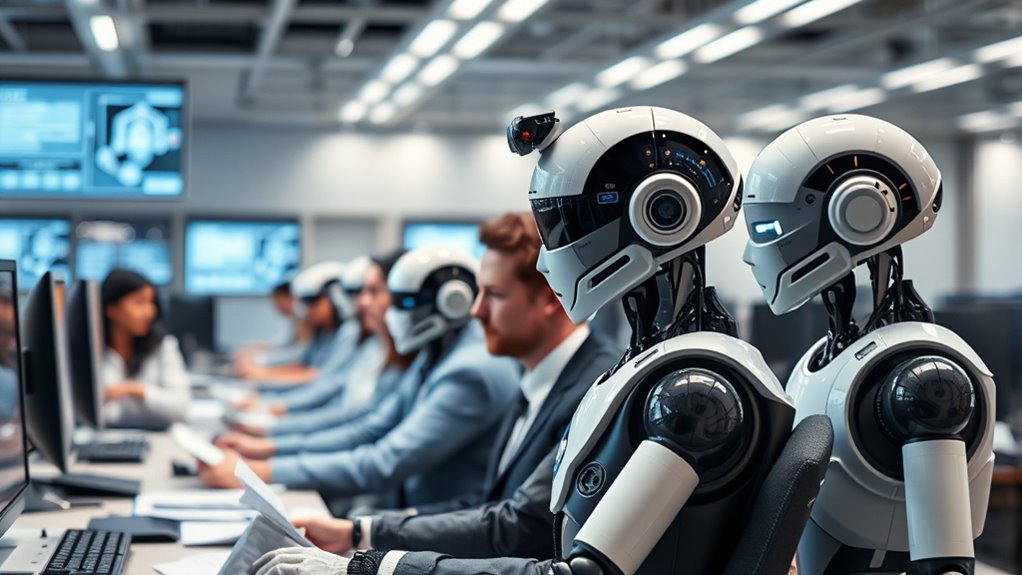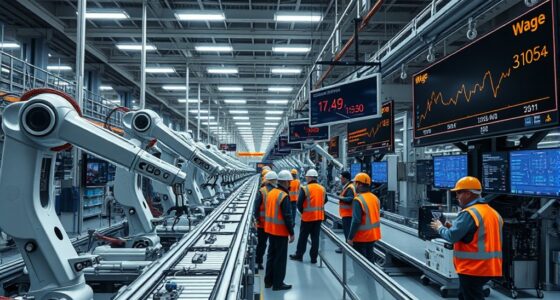You should be aware that roles in administrative support, customer service, manufacturing, finance, and legal sectors are most vulnerable to AI integration. Tasks like scheduling, basic inquiries, routine data processing, and repetitive physical work are increasingly automated. This means many jobs in these areas could be at risk, especially those involving routine tasks. Staying informed about how AI is impacting these fields can help you better prepare for the changes ahead and discover strategies to adapt successfully.
Key Takeaways
- Routine administrative tasks like scheduling and email management are increasingly handled by AI, threatening secretarial and clerical roles.
- Customer service positions are declining as AI chatbots efficiently replace human support agents.
- Low-skill manufacturing jobs are displaced by robots and AI-driven machinery performing repetitive physical tasks.
- Financial and legal roles involving data processing, such as accounting and contract review, are being automated.
- Roles requiring high emotional intelligence or complex decision-making, such as healthcare and education, remain less affected.

Automation Alert
Have you noticed how automation is transforming workplaces across industries? It’s reshaping jobs, especially roles defined by repetitive tasks or routine processes. By 2030, about 30% of U.S. jobs could be automated, with clerical and administrative roles among the most vulnerable. If you’re a secretary, data entry clerk, or administrative professional, you’re likely aware that AI systems now handle scheduling, email drafting, and expense tracking. These tools improve speed and accuracy, reducing human error but also threatening your job security. As AI takes over these routines, companies may cut back on full-time staff, impacting payroll clerks and executive assistants who traditionally support leadership and manage administrative operations.
Automation is reshaping administrative jobs, with AI handling scheduling, emails, and expense tracking.
Customer service is another sector feeling the impact. AI chatbots and virtual assistants are set to replace a significant portion of customer support roles, with an expected 5% decline in employment by 2033. These AI tools provide around-the-clock support, handling inquiries efficiently and consistently without fatigue. Major companies like Bank of America and H&M are already deploying AI assistants to streamline their support departments. This technology reduces response times and lowers operational costs, making routine inquiries faster and cheaper to resolve. Meanwhile, telemarketers are increasingly replaced by automated calling and messaging systems, further reducing traditional roles in outbound sales. Incorporating wall organization systems and aesthetic decor solutions can also help offices create more efficient and visually appealing work environments that adapt to technological changes.
In manufacturing, automation has already displaced over 1.7 million jobs since 2000. Robots and AI-driven machinery now handle repetitive physical tasks, especially in predictable or low-skill roles. As a result, many factory jobs, particularly low-paid positions, are disappearing globally. This shift is driven by the ability of AI to perform physical labor more precisely and efficiently, leading to a decline in employment in this sector. The impact of automation varies greatly across regions, with advanced economies experiencing higher disruption rates. Efforts to incorporate stylish and functional workspace decor, such as aesthetic hooks and wall organization solutions, can help make remaining roles more comfortable and efficient.
Finance and legal roles are also at risk. Credit analysts, accountants, and auditors face job reductions as AI algorithms process data faster and more accurately than humans. Routine financial reporting, compliance, and credit risk assessments are increasingly automated. Similarly, legal assistants, proofreaders, and document reviewers are being replaced by AI systems capable of parsing contracts, reviewing documents, and spotting errors efficiently. These changes threaten traditional roles but also push professionals toward more complex, strategic tasks that AI cannot easily perform. Maintaining a professional environment can be complemented with stylish table linens and decor that foster a focus on innovation and growth.
While some jobs, like healthcare and education, are less impacted, many roles across industries are evolving rapidly. Staying adaptable and embracing new tech skills will be essential as AI continues to reshape the workforce landscape.
Frequently Asked Questions
How Can Workers Prepare for Ai-Induced Job Changes?
To prepare for AI-induced job changes, you should focus on developing interdisciplinary skills that combine human judgment with AI capabilities. Embrace lifelong learning through online courses, certifications, and practical AI tool training. Stay adaptable by considering geographic or industry mobility, and cultivate skills in creativity, emotional intelligence, and complex problem-solving. Additionally, foster a growth mindset, stay informed about AI trends, and seek roles that complement AI systems, ensuring your job remains relevant.
Which Industries Are Least Affected by AI Automation?
You’ll find industries like healthcare, construction, education, and the creative arts least affected by AI automation. In healthcare, emotional intelligence and complex decision-making keep jobs secure. Construction relies on manual skills and safety regulations that AI can’t replicate. Education depends on personalized interaction and ethical judgment, while creative fields require originality and emotional expression. Your human touch remains essential, making these sectors more resistant to AI-driven changes.
What Ethical Concerns Arise From AI Replacing Human Roles?
Imagine a workplace where AI replaces your role, like a puppet master pulling strings. You might worry about losing dignity, rights, and fairness. Ethical concerns include bias in AI decisions, invasion of privacy, and eroded trust. You could face discrimination or workplace injury from unchecked automation. Over-reliance risks dehumanizing work, making it essential to guarantee AI remains accountable, unbiased, and respects human judgment and dignity at every step.
How Does AI Impact Job Security in the Short Term?
You might find your job temporarily at risk as AI adoption accelerates, especially if you work in administrative, retail, or customer service roles. AI can lead to short-term layoffs or changes , but these effects often fade within two years. Stay adaptable, learn new skills, and be ready for shifts in your industry, because while your job could be impacted now, there’s potential for new opportunities as the labor market adjusts.
What Skills Will Be Most Valuable in an Ai-Driven Workplace?
In an AI-driven workplace, your critical thinking and problem-solving skills become your greatest assets, as they’re predicted to be in high demand. Studies show that 80% of jobs will require some level of digital literacy. You’ll need to stay adaptable, continuously reskill, and communicate complex ideas clearly. By embracing lifelong learning and developing leadership skills, you’ll position yourself to thrive amid rapid technological changes and AI advancements.
Conclusion
As you navigate this evolving landscape, remember that like a river shaping its banks, AI will reshape job roles. For example, a factory worker once replaced by automation found new skills in overseeing machines, turning a threat into opportunity. Embrace change, stay adaptable, and see AI not just as a threat but as a tool to carve out new paths. Your ability to adapt will determine how smoothly you flow with the currents of automation.









